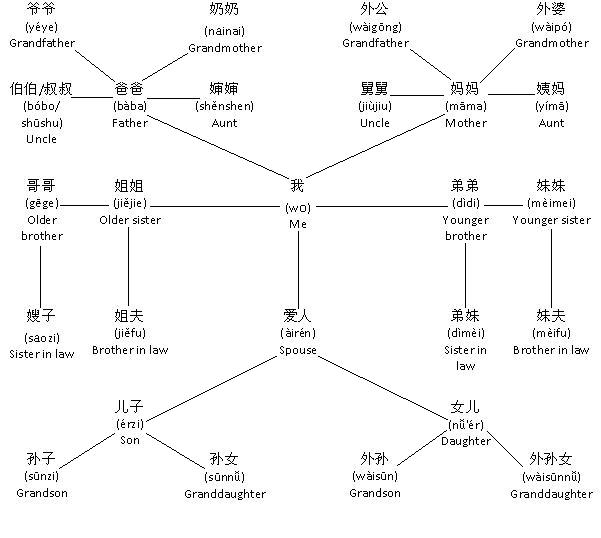Confucian Chinese Family Relationship and the Obama Family
Tue, 2012-10-02 17:56 — charleswang



For those who may not know, the family is arguably the most important social institution in China and blood ties have traditionally been the cornerstone of society. This article presents an overview of the Confucian Chinese family relationship and studies the genealogy of Barack Hussein Obama II, 44th President of the United States. This blog post closely relates to this week’s topic “Describing Relationships and Structures.”
Despite the fact that Chinese society has been heavily influenced by the one-child policy introduced in 1978 and by the West in recent years, many Chinese still cling to their long held beliefs in Confucianism. With the influence of Confucianism, the concepts of family kinship are deeply ingrained in Chinese culture. Confucius considered the Five Cardinal Relationships the backbone of society, which includes: 1. Ruler and Subject 2. Father and Son 3. Elder and Younger brother 4. Husband and Wife and 5. Friends, three of which being family-related. We learned that cardinality is “the number of instances that can be associated with each entity type” from the architectural perspective of describing relationship in 10/2 lecture.
From my perspective, the Confucian Chinese family relationship has three characteristics: Subordinate, Paternalistic, and Hierarchical. (Reference: http://family.jrank.org/pages/253/China-Regulations-Family-Relationships.html)
- Subordinate: Confucius studied family relationships by observing Chinese villages, where he discovered three main relationship pairs: parent to child, husband to wife, and elder to younger. In each case, Confucius believed that one person (the husband, parent, or elder) should command and protect while the other (the wife, the child, or the younger) should obey. Each position came with certain responsibilities and obligations.
- Paternalistic: For thousands of years, Chinese families desire to perpetuate the family name. In Chinese and many other societies, boys perpetuate the family name while girls do not.
- Hierarchical: Everyone in a Chinese Confucian family literally has rank. The elder has authority over the young; boys have authority over girls; and fathers have authority over their children.
A list of Chinese kinship terms can be found at: http://www.kwanfamily.info/culture/familytitles_table.php
An example of traditional Chinese family tree is shown at: http://mychinesenotebook.blogspot.com/2011/10/chinese-relationship-tree.html
It is interesting to know how the family trees of non-Chinese look like. I chose President Barack Obama as example. Below is the Barack Obama Family Tree first appeared at American Thinker by Jeannie DeAngelis on September 3, 2011. This tree graph corresponded to the 2011 “Yes We Kenya Clan” reality show, which had the creative idea to star the eclectic, zany cast of Barack Obama’s Kenyan family members. (From: http://wtpotus.wordpress.com/2011/09/06/its-all-in-the-obama-family-or-as-the-boughs-break/ The family tree captured the president’s Kenyan paternal cousins, step-grandmothers, half-brothers, half-sisters, aunts, and uncles.

Another genealogy of the Obama family can be found from a 2010 American Digest post: http://americandigest.org/mt-archives/enemies_foreign_domestic/barack_obamas_family_spla.php Parallel lines indicate spouse/partner relationships, whereas arrows indicate lineal consanguinity.

Several observations from the three family trees (1 from the Chinese Confucian Family example, 2 from the Obama family):
- The first example has maternal and paternal lineages distinguished, but the examples of the Obama’s do not. In the Chinese family tree, for instance, a mother's brother and a father's brother have different terms.
- The relative age of a sibling relation in the Chinese genealogy is considered. For example, a father's younger brother (Chinese: shushu) has a different terminology than his older brother (Chinese: bobo).
- In all three examples, the gender of the relative is distinguished.
Although the Confucian family relationships may be confusing for non-Chinese, the principle of kinship is still widely accepted and practiced among Chinese civilization. Confucianism may not match our modern ideas about gender equality and individual liberty, but it is still espoused by hundreds of millions of Chinese today. That is to say, it is one of the largest religions in the world and an important one for the rest of the world to understand.
- charleswang's blog
- Login to post comments